外研版(2019)必修第一册Unit 2 Exploring English Words and Understanding Ideas 课件(共64张PPT)
文档属性
| 名称 | 外研版(2019)必修第一册Unit 2 Exploring English Words and Understanding Ideas 课件(共64张PPT) |
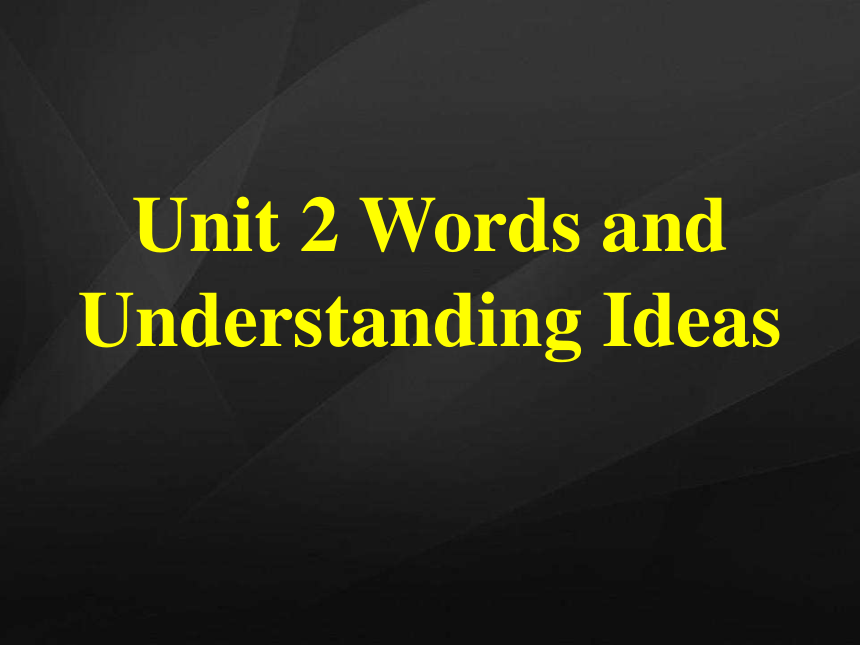
|
|
| 格式 | pptx | ||
| 文件大小 | 9.3MB | ||
| 资源类型 | 教案 | ||
| 版本资源 | 外研版(2019) | ||
| 科目 | 英语 | ||
| 更新时间 | 2023-03-09 00:00:00 | ||
图片预览

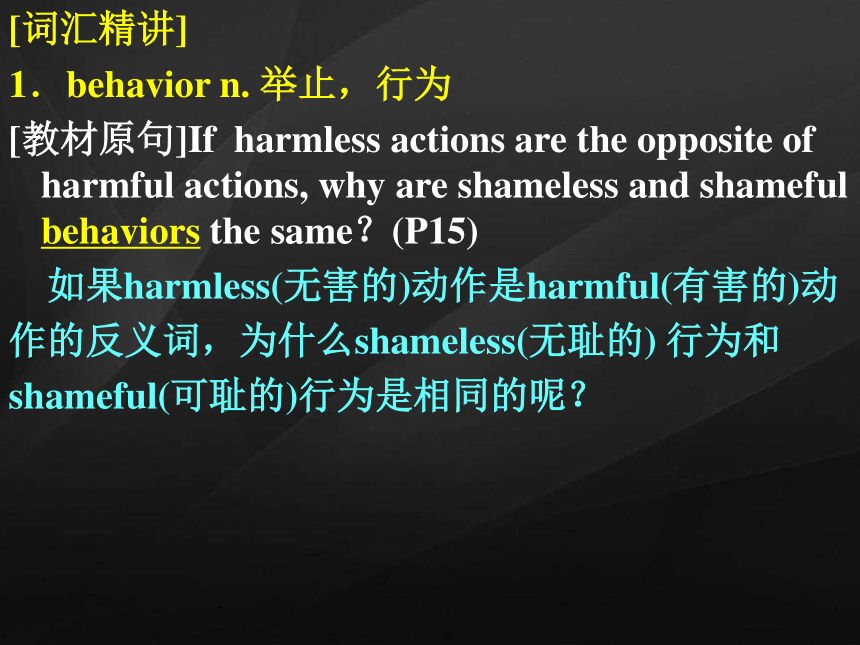
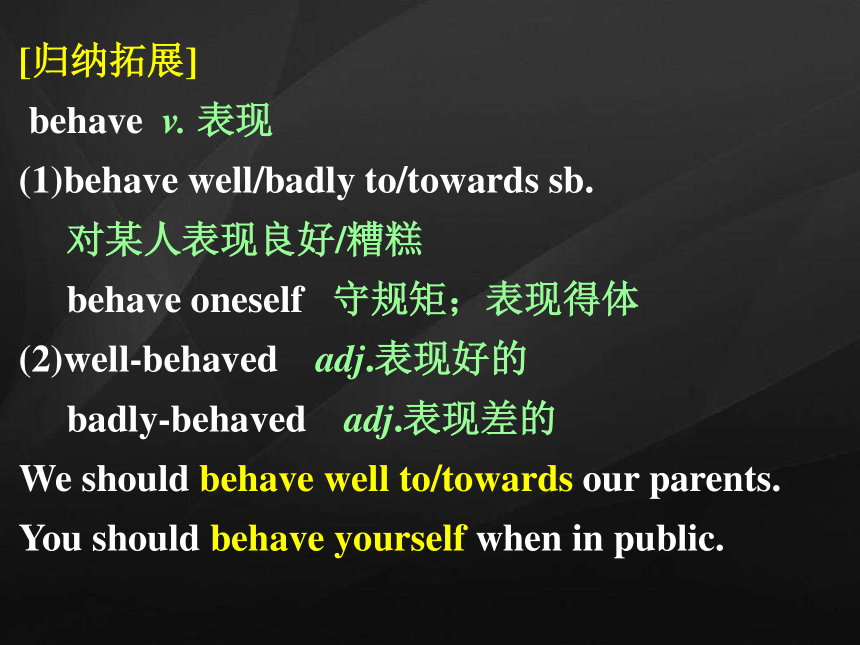
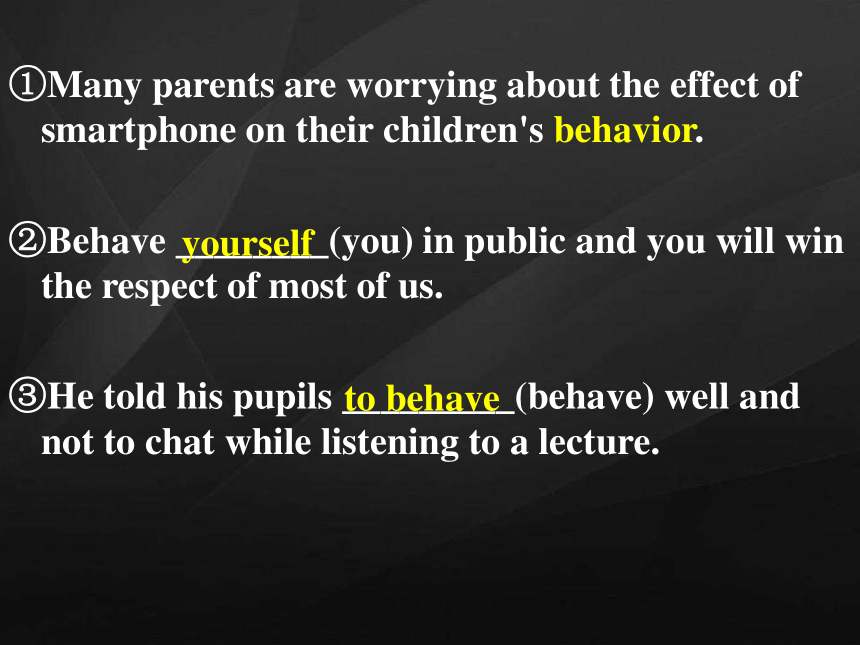

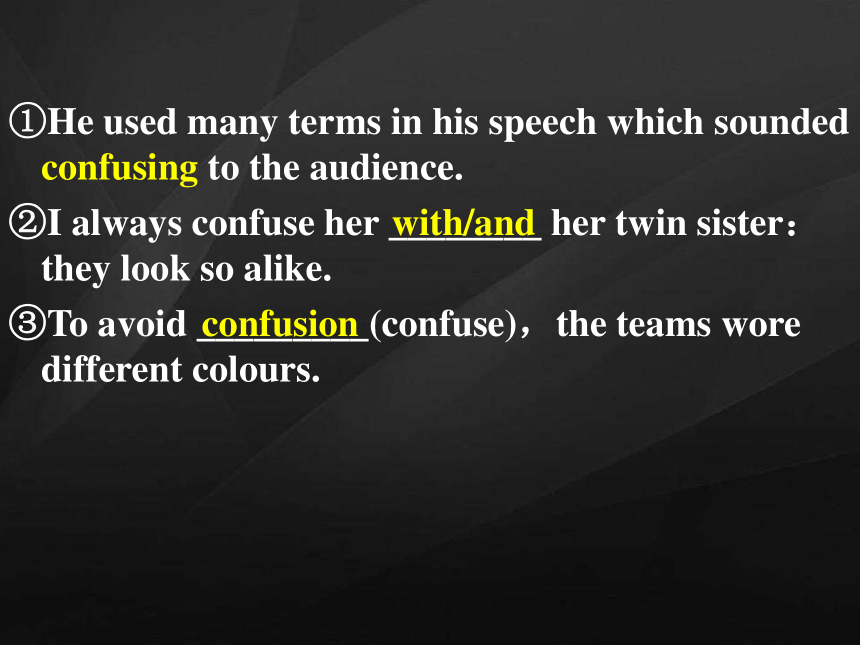
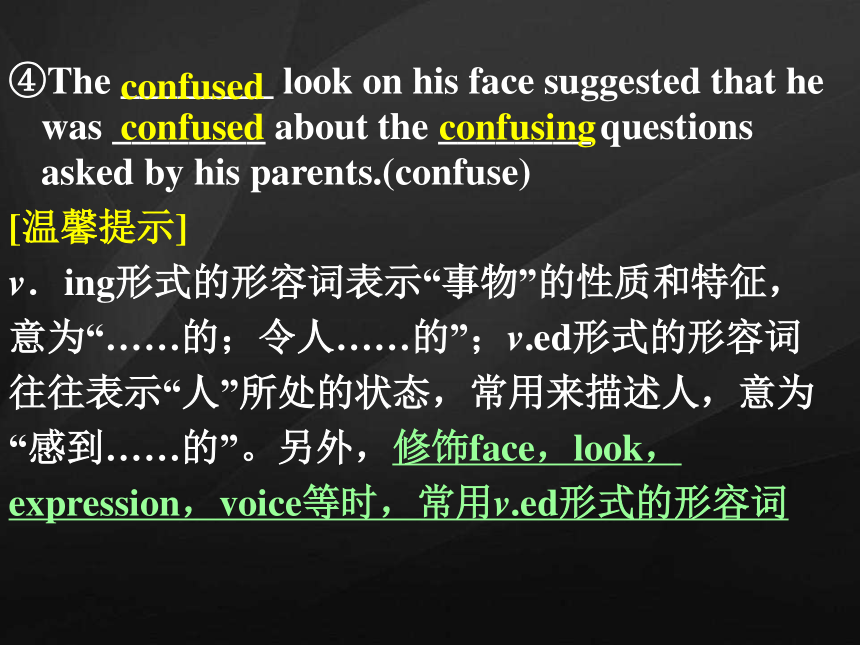
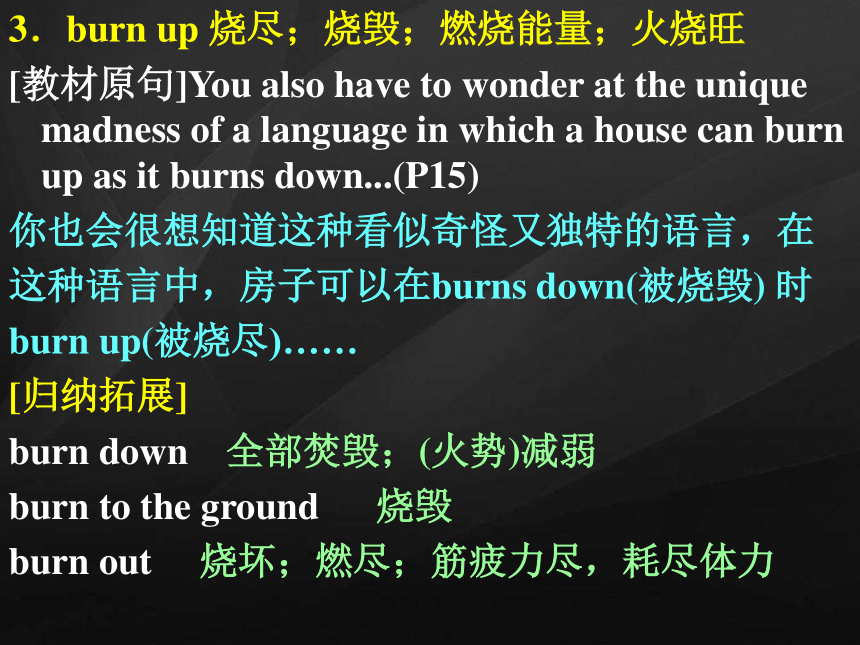
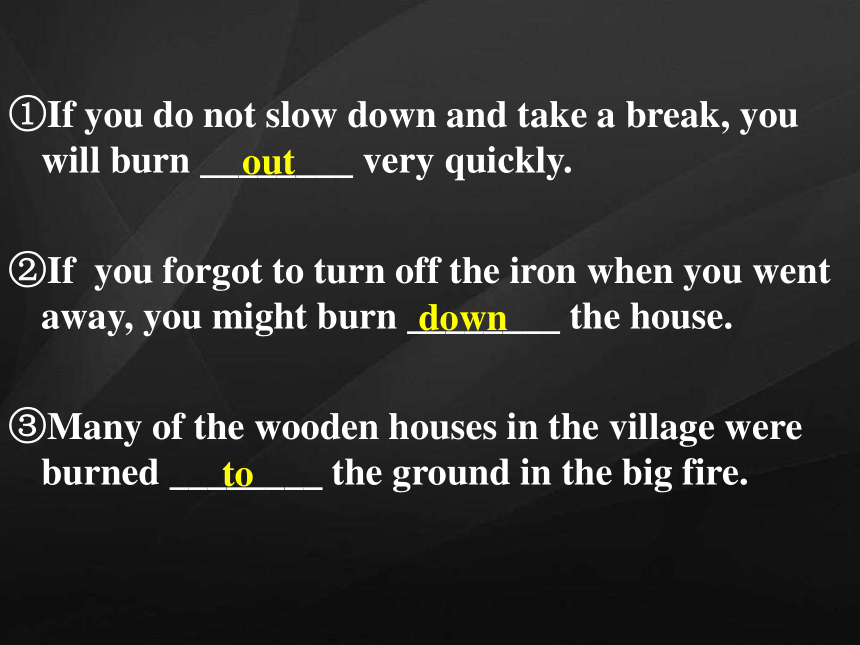
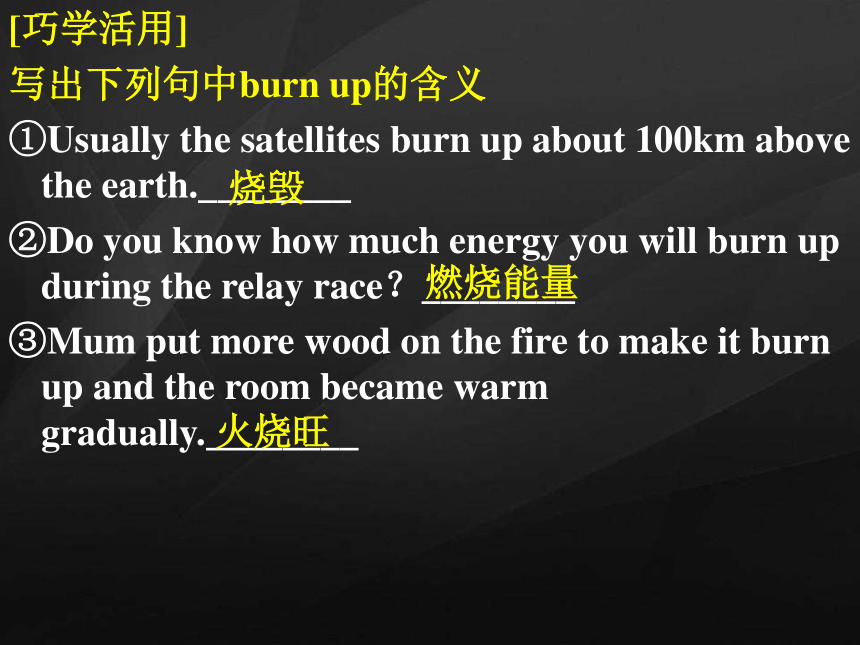
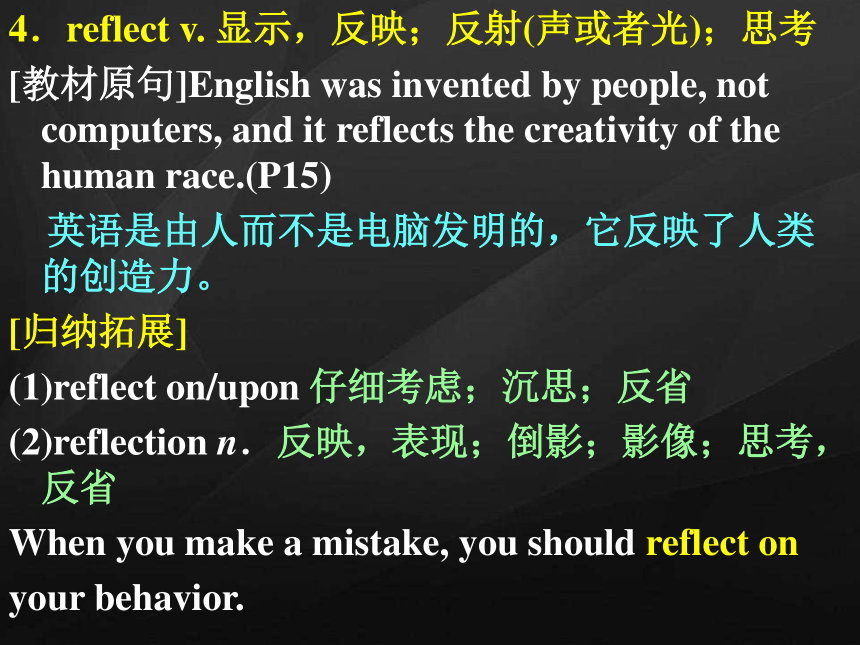
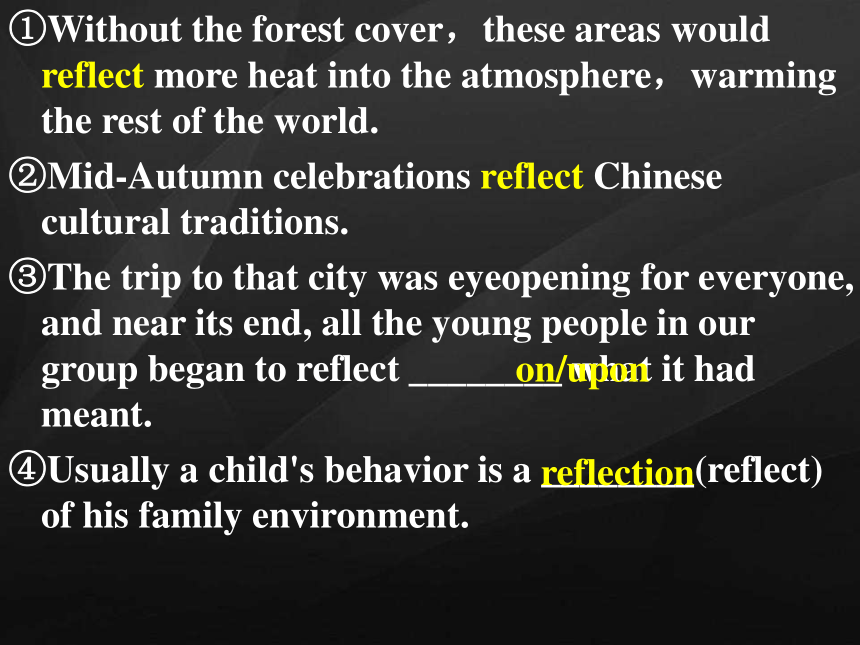
文档简介
(共64张PPT)
Unit 2 Words and Understanding Ideas
[词汇精讲]
1.behavior n. 举止,行为
[教材原句]If harmless actions are the opposite of harmful actions, why are shameless and shameful behaviors the same?(P15)
如果harmless(无害的)动作是harmful(有害的)动
作的反义词,为什么shameless(无耻的) 行为和
shameful(可耻的)行为是相同的呢?
[归纳拓展]
behave v. 表现
(1)behave well/badly to/towards sb.
对某人表现良好/糟糕
behave oneself 守规矩;表现得体
(2)well -behaved adj.表现好的
badly- behaved adj.表现差的
We should behave well to/towards our parents.
You should behave yourself when in public.
①Many parents are worrying about the effect of smart phone on their children's behavior.
②Behave ________(you) in public and you will win the respect of most of us.
③He told his pupils _________(behave) well and not to chat while listening to a lecture.
yourself
to behave
2.confusing adj. 令人困惑的;令人混淆的
[教材原句]Even the smallest words can be confusing.(P15)
即使是最小的单词也会令人困惑。
[归纳拓展]
(1)confuse vt.使迷惑;混淆
confuse... with/and... 把……和……混淆
(2)confusion n.混乱;困惑
(3)confused adj.困惑的
①He used many terms in his speech which sounded confusing to the audience.
②I always confuse her ________ her twin sister:they look so alike.
③To avoid _________(confuse),the teams wore different colours.
with/and
confusion
④The ________ look on his face suggested that he was ________ about the ________ questions asked by his parents.(confuse)
[温馨提示]
v. ing形式的形容词表示“事物”的性质和特征,
意为“……的;令人……的”;v. ed形式的形容词
往往表示“人”所处的状态,常用来描述人,意为
“感到……的”。另外,修饰face,look,
expression,voice等时,常用v. ed形式的形容词
confused
confused
confusing
3.burn up 烧尽;烧毁;燃烧能量;火烧旺
[教材原句]You also have to wonder at the unique madness of a language in which a house can burn up as it burns down...(P15)
你也会很想知道这种看似奇怪又独特的语言,在
这种语言中,房子可以在burns down(被烧毁) 时
burn up(被烧尽)……
[归纳拓展]
burn down 全部焚毁;(火势)减弱
burn to the ground 烧毁
burn out 烧坏;燃尽;筋疲力尽,耗尽体力
①If you do not slow down and take a break, you will burn ________ very quickly.
②If you forgot to turn off the iron when you went away, you might burn ________ the house.
③Many of the wooden houses in the village were burned ________ the ground in the big fire.
out
down
to
[巧学活用]
写出下列句中burn up的含义
①Usually the satellites burn up about 100km above the earth.________
②Do you know how much energy you will burn up during the relay race?________
③Mum put more wood on the fire to make it burn up and the room became warm gradually.________
烧毁
燃烧能量
火烧旺
4.reflect v. 显示,反映;反射(声或者光);思考
[教材原句]English was invented by people, not computers, and it reflects the creativity of the human race.(P15)
英语是由人而不是电脑发明的,它反映了人类的创造力。
[归纳拓展]
(1)reflect on/upon 仔细考虑;沉思;反省
(2)reflection n.反映,表现;倒影;影像;思考,反省
When you make a mistake, you should reflect on
your behavior.
①Without the forest cover,these areas would reflect more heat into the atmosphere,warming the rest of the world.
②Mid -Autumn celebrations reflect Chinese cultural traditions.
③The trip to that city was eye opening for everyone, and near its end, all the young people in our group began to reflect ________ what it had meant.
④Usually a child's behavior is a ________(reflect) of his family environment.
on/upon
reflection
[语境助记]
The light reflected from the water into my eyes.
White clouds were reflected in the lake. Sitting by
the lake, I was reflecting on what my mom said.
On reflection, I decided to accept her suggestion.
5.creativity n. 创造性;创造力;创作能力
[教材原句]English was invented by people, not computers, and it reflects the creativity of the human race.(P15)
英语是由人而不是电脑发明的,它反映了人类的创造力。
[归纳拓展]
create v. 创造;创作;创立
creation n. 创造;创造物
creative adj. 创造性的,有创造力的; 有创意的
creator n. 创作人;创作者;创始人
①American art reached a peak of creativity in the 50s and 60s.
②It was with faithfulness that we ________(create) a harmonious atmosphere.
③She's very ________(create)—she writes poetry and paints.
④Language is the most important mental
________ (create) of man.
⑤Jobs was without doubt one of the ________
(create) of the Apple Inc..
created
creative
creation
creators
Unit 2
Exploring
P1 Starting out
Which language has the largest number of native speakers
Look and say
Because China has the largest population in the world.
Chinese 1,390million
Which language has the largest number of learners
English
1,500 million
Among these 1,500 million English learners, do you know how many learners are there in China
Complete the table according to Chart 3
What conclusion can you draw from Chart 3
50 million
200 million
300 million
The number of English Learners in China is increasing greatly.
Watch and say
1. Which countries mentioned in the video have English as their first language
2. Where do a third of English words come from What examples are given in the video
Answers:
1. The UK, Ireland, the USA, Canada, New Zealand and Australia.
2. More than a third of English words come from French, such as fruit, table, crocodile, invasion.
Understanding ideas
title
ham
eggplant
pine
pineapple
sculpt
sculpture
seasick
n. 题目,标题
n. 火腿
n. 茄子
n. 松树
n. 菠萝
v. 雕刻,雕塑
n. 雕像,雕刻品,雕塑作品
adj. 晕船的
Words and Expressions
airsick
carsick
homesick
opposing
behavior
confusing
capitalized
unique
adj. 晕机的
adj. 晕车的
adj. 想家的
adj. (观点、意见等)相反的,相对立的
n. 举止,行为
adj. 令人困惑的
adj. 大写的
adj. 独一无二的;独特的
Words and Expressions
burn up
burn down
alarm
reflect
creativity
visible
wind up
creative
烧毁,烧尽
烧毁
n. 警报器;闹钟
v. 显示,反映
n. 创造性,创造力
adj. 看得见的,可见的
给(机械)上发条;使(活动、会议等)结束
adj. 创造(性)的
Words and Expressions
Sometimes we can get an English word’s meaning from its formation.
football
snowfall
afternoon
takeaway
indoor
notebook
playground
bathroom
hard-working
warm-hearted
schoolgirl
blackboard
bookshop
weekend
I was arrested(逮捕) at the airport. Just because I was greeting my cousin Jack! All that I said was “Hi! Jack,” but very loud.
why
Sometimes people will make mistakes or funny stories because of the misusing of English words.
Hi! Jack
Hijack(打劫)
So, we may make mistakes when we’re learning English only by understanding a word from its formation.
We’re going to learn something interesting about these words. Can you speak out their meaning
hamburger eggplant pineapple paint
sculpt sculpture painting take a photo
in a car/taxi on a train/bus sick homework housework hard soft hardly rain snow sunshine US alarm
Before reading
Look at the title of the passage and the pictures. What do you think the passage is about
Neither Pine nor
Apple in Pineapple
food
cooking
words
fruit
plants
Now let's read the passage and check the answer.
Task
1
While reading
Read and finish the tasks as quickly as possible.
1. To tell us that English is very difficult to learn.
2. To give advice on how to learn English.
3. To show that English is interesting and creative.
4. To explain how English was created.
Task
2
Choose the author’s purpose in writing the passage.
P16 3
Why do you think so Can you find examples in the passage
interesting
creative
Ⅱ. Read the text carefully and choose the best answer according to the text.
1.How does the author support his/her idea in the passage
A.By listing numbers.
B.By making comparison.
C.By giving some examples.
D.By using some research results.
2.What is the author's purpose in writing the passage
A.To explain how English was created.
B.To give advice on how to learn English.
C.To tell us that English is very difficult to learn.
D.To show that English is interesting and creative.
3.Which of the following statements is NOT true according to the passage
A.When we see rain, we can say it's raining.
B.When we see the capitalized “WHO” in a medical report, we can read it as the “who” in “Who's that?”.
C.Harmless actions are the opposite of harmful actions.
D.We can see the stars when they are out.
4.What do the two phrases “wind up” mean in the last sentence
A.They both mean “turn a handle”.
B.They both mean “finish or stop doing sth.” .
C.The first means “turn a handle”, and the second means “finish or stop doing sth.” .
D.The first means “finish or stop doing sth.” , and the second means “turn a handle”.
unique
Complete the notes with words from the passage.
Task
3
P16 4
Para.1
no egg in eggplant
no ham in ____________
neither pine nor apple in __________
老婆饼
鱼香肉丝
夫妻肺片
hamburger
pineapple
Look at Chinese examples
Para.2
sculpt a sculpture
paint a(n) _________
BUT take a photo
seasick sick at sea
________ sick in the air
________ sick in the car
BUT __________ sick at home
painting
airsick
homesick
carsick
Para.3
“Hard” is the opposite of “soft”.
BUT “Hardly” and “softly” are not a(n) ________ pair.
“Harmless” is the opposite of “harmful”.
BUT Shameful and shameless _________ are the same.
Para.4
When we see rain or snow, we can say “it's raining” or “it's _________.”
BUT when we see sunshine, we can't say “it's __________.”
opposing
behaviors
snowing
sunshining
Para.6
burn up burn down
fill in a form _______ a form
Para.7
Stars are out. They are visible.
Lights are out. They are ________.
I wind up my watch. It starts.
I wind up the passage. It _______.
fill out
invisible
ends
unique
hamburger
pineapple
painting
behaviors
fill out
airsick
homesick
invisible
opposing
ends
reflects
carsick
P16 4
Fill in the blanks and try to retell the passage Neither Pine nor Apple in Pineapple.
4
After reading
analyzing, mindmap, summary, retelling
Introduce the topic
List some examples
Draw a conclusion
The author's opinion
Learn to understand the passage.
1
Topic
Neither Pine nor Apple in Pineapple
Have you ever asked yourself why people often have trouble learning English I hadn't, until one day my five- year- old son asked me whether there was ham in a hamburger. There isn't. This made me realize that there's no egg in eggplant either. Neither is there pine nor apple in pineapple. This got me thinking how English can be a crazy language to learn.
老婆饼
鱼香肉丝
夫妻肺片
For example, in our free time we can sculpt a sculpture and paint a painting, but we take a photo. And when we are traveling we say that we are in the car or the taxi, but on the train or bus! While we're doing all this traveling, we can get seasick at sea, airsick in the air and carsick in a car, but we don't get homesick when we get back home. And speaking of home, why aren't homework and housework the same thing?
If “hard” is the opposite of “soft”, why are “hardly” and “softly” not an opposing pair If harmless actions are the opposite of harmful actions, why are shameless and shameful behaviors the same
When we look out of the window and see rain or snow, we can say “it's raining” or “it's snowing”. But when we see sunshine, we can't say “it's sunshining”.
Even the smallest words can be confusing. When you see the capitalized “WHO” in a medical report, do you read it as the “who” in “Who's that?” What about “IT” and “US”?
You also have to wonder at the unique madness of a language in which a house can burn up as it burns down, in which you fill in a form by filling it out, and in which an alarm is only heard once it goes off!
English was invented by people, not computers, and it reflects the creativity of the human race. That is why when the stars are out, they are visible, but when the lights are out, they are invisible. And that is why when I wind up my watch, it starts, but when I wind up this passage, it ends.
课文语法填空
Have you ever asked 1.________(you) why people often have trouble 2.________(learn) English I hadn't, until one day my five -year- old son asked me 3.________ there was ham in a hamburger. This got me thinking how English can be a crazy language 4.________(learn).
Even the smallest words can be 5.________ (confuse).You also have to wonder at the unique madness of a language in 6.________ a house can burn up as it burns down, and in which an alarm 7.________(hear) once it goes off!
yourself
learning
whether
to learn
confusing
which
is heard
English 8.____________(invent) by people, not computers, and it reflects the creativity of the human race. That is why when the stars are out, they are visible, but when the 9.________(light) are out, they are invisible. And that is why when I wind up my watch, it starts, 10.________ when I wind up this passage, it ends.
was invented
lights
but
Language Points
1.Have you ever asked yourself why people often have trouble learning English?(P14)
你有没有问过自己为什么人们在学习英语时经常遇到困难?
句中have trouble(in) doing sth.意为“做某事有困难、费力”,其中doing 前面省略了in。其中trouble 为不可数名词,前面可用some,any,no,little等词来修饰。
[归纳拓展]
表示“做某事有困难”的常见结构:
have difficulty with sth.
have trouble/problem(in) doing sth.
have a hard time in doing sth.
there's difficulty/trouble with sth.
in doing sth.
I have difficulty/ trouble with English.
in learning English.
She had a hard time in finding his house.
There is difficulty/trouble with the text.
There is difficulty/trouble in finishing the task
on time.
①—Did you have trouble finding Ann's house
—Not really. She had given us clear directions and we were able to find it easily.
②For him, there is no difficulty _________(answer) such an easy question.
③I had a hard time ________(climb) up the horse while he was riding happily.
answering
climbing
[温馨提示]
在语法填空中,常将have trouble(in) doing sth.句式中的trouble/ difficulty提前作先行词,因此定语从句中have后常为 doing形式。试比较:
You can't imagine what great difficulty we have ever had finding the right person.
You can't imagine what great difficulty we have ever had found the right person.
Do you know the trouble I have ______ (learn) English
Do you know the trouble (that) I have (in) learning English
( √ )
(×)
2. This made me realize that there’s no egg in eggplant either.
“make+ 宾语+宾补”,宾语补足语通常由名词、形容词、省略to的不定式(短语)、过去分词来充当。“使……做某事”
It’ll make me happy if you accept it.
make+宾语+名词
And he made the whole factory a moving
production line.
make+宾语+形容词
News reports make people famous.
make+宾语+过去分词
I had to speak aloud to make myself heard
by all the students.
make+宾语+省略to的不定式
The teacher made the girl study six hours a day.
注意:
在被动语态中,此结构中被省略的不定式符号to要还原。
The girl was made to study six hours a day.
【语境应用】单句语法填空。
Paul doesn’t have to be made __________ (learn). He always works hard.
These photos made me _________(think) of my schooldays.
to learn
think
3.Neither is there pine nor apple in pineapple.
pineapple(菠萝)里既没有pine(松树)也没有apple(苹果)。
(1)“就近一致”原则
neither…nor…连接两个名词或代词作主语时,谓语动词的数遵循“就近原则”,有同样用法的还有either…or…(或者……或者……),not only…but also…(不但……而且……),not…but(不是……而是……)等。
Neither the students nor the teacher knows anything about it.
Either she or I am going there tomorrow.
Not only you but also he is going to join the club.
(2) 否定副词放句首,主句构成部分倒装。
neither置于句首的部分倒装句式语序为:neither+系动词be/助动词/情态动词+主语+动词原形(不含系动词be) +其他成分。可用nor替换neither。
There is neither pine nor apple in pineapple.
Neither is there pine nor apple in pineapple.
[归纳拓展]
以否定副词位于句首时,主句要部分倒装。常见的表示否定意义的副词(短语)有: hardly,rarely,scarcely,nowhere,never,not,little,seldom,at no time,in no way,by no means,under no condition,not until,neither,nor等。
We should never give up.
Never should we give up.
He seldom came to visit me when I was in England.
Seldom did he come to visit me when I was in
England.
①If he doesn't go to the park tomorrow,
neither/ nor will I.
②Nor ______________________ where we should go next.
我也不知道我们下一步去哪里。
③Never ________________________ so wonderful as that.
以前我从未看见那样精彩的东西。
④Little ____________________ the man making speech.
我们对这个演讲的人几乎一无所知。
do I know
have I seen anything
did/do we know about
4.That is why when the stars are out, they are visible, but when the lights are out, they are invisible.(P15)
那就是为什么星星out(出来)时是看得见的,但灯out(熄灭)时是看不见的。
This is why...是一个常用句型,意为“这/那是……的原因”。
[归纳拓展]
(1)This/That/It is because...这是/那是因为……
(because引导表语从句,表示原因)
This/That/It is why...这是/那是…的原因
(why引导表语从句,表示结果)
I was late. This is because I got up late.
I got up late. This is why I was late.
(2) The reason why... is that...……的原因是……
(why引导定语从句,that引导表语从句,表示原因)
The reason why I was late is that I got up late.
①Tom was ill. That was why he was absent from class.
②Tom was absent. That was ________ he was ill.
③The reason ________ Tom was absent from class was ________ he was ill.
because
why
that
[巧学活用]
一句多译
她很伤心,那是因为她儿子在一次事故中丧生了。
①She was very sad. _____________ her son was killed in an accident.
②Her son was killed in an accident. ____________ she was very sad.
③The reason __________________________ her son was killed in an accident.
That's because
That's why
why she was very sad was that
Unit 2 Words and Understanding Ideas
[词汇精讲]
1.behavior n. 举止,行为
[教材原句]If harmless actions are the opposite of harmful actions, why are shameless and shameful behaviors the same?(P15)
如果harmless(无害的)动作是harmful(有害的)动
作的反义词,为什么shameless(无耻的) 行为和
shameful(可耻的)行为是相同的呢?
[归纳拓展]
behave v. 表现
(1)behave well/badly to/towards sb.
对某人表现良好/糟糕
behave oneself 守规矩;表现得体
(2)well -behaved adj.表现好的
badly- behaved adj.表现差的
We should behave well to/towards our parents.
You should behave yourself when in public.
①Many parents are worrying about the effect of smart phone on their children's behavior.
②Behave ________(you) in public and you will win the respect of most of us.
③He told his pupils _________(behave) well and not to chat while listening to a lecture.
yourself
to behave
2.confusing adj. 令人困惑的;令人混淆的
[教材原句]Even the smallest words can be confusing.(P15)
即使是最小的单词也会令人困惑。
[归纳拓展]
(1)confuse vt.使迷惑;混淆
confuse... with/and... 把……和……混淆
(2)confusion n.混乱;困惑
(3)confused adj.困惑的
①He used many terms in his speech which sounded confusing to the audience.
②I always confuse her ________ her twin sister:they look so alike.
③To avoid _________(confuse),the teams wore different colours.
with/and
confusion
④The ________ look on his face suggested that he was ________ about the ________ questions asked by his parents.(confuse)
[温馨提示]
v. ing形式的形容词表示“事物”的性质和特征,
意为“……的;令人……的”;v. ed形式的形容词
往往表示“人”所处的状态,常用来描述人,意为
“感到……的”。另外,修饰face,look,
expression,voice等时,常用v. ed形式的形容词
confused
confused
confusing
3.burn up 烧尽;烧毁;燃烧能量;火烧旺
[教材原句]You also have to wonder at the unique madness of a language in which a house can burn up as it burns down...(P15)
你也会很想知道这种看似奇怪又独特的语言,在
这种语言中,房子可以在burns down(被烧毁) 时
burn up(被烧尽)……
[归纳拓展]
burn down 全部焚毁;(火势)减弱
burn to the ground 烧毁
burn out 烧坏;燃尽;筋疲力尽,耗尽体力
①If you do not slow down and take a break, you will burn ________ very quickly.
②If you forgot to turn off the iron when you went away, you might burn ________ the house.
③Many of the wooden houses in the village were burned ________ the ground in the big fire.
out
down
to
[巧学活用]
写出下列句中burn up的含义
①Usually the satellites burn up about 100km above the earth.________
②Do you know how much energy you will burn up during the relay race?________
③Mum put more wood on the fire to make it burn up and the room became warm gradually.________
烧毁
燃烧能量
火烧旺
4.reflect v. 显示,反映;反射(声或者光);思考
[教材原句]English was invented by people, not computers, and it reflects the creativity of the human race.(P15)
英语是由人而不是电脑发明的,它反映了人类的创造力。
[归纳拓展]
(1)reflect on/upon 仔细考虑;沉思;反省
(2)reflection n.反映,表现;倒影;影像;思考,反省
When you make a mistake, you should reflect on
your behavior.
①Without the forest cover,these areas would reflect more heat into the atmosphere,warming the rest of the world.
②Mid -Autumn celebrations reflect Chinese cultural traditions.
③The trip to that city was eye opening for everyone, and near its end, all the young people in our group began to reflect ________ what it had meant.
④Usually a child's behavior is a ________(reflect) of his family environment.
on/upon
reflection
[语境助记]
The light reflected from the water into my eyes.
White clouds were reflected in the lake. Sitting by
the lake, I was reflecting on what my mom said.
On reflection, I decided to accept her suggestion.
5.creativity n. 创造性;创造力;创作能力
[教材原句]English was invented by people, not computers, and it reflects the creativity of the human race.(P15)
英语是由人而不是电脑发明的,它反映了人类的创造力。
[归纳拓展]
create v. 创造;创作;创立
creation n. 创造;创造物
creative adj. 创造性的,有创造力的; 有创意的
creator n. 创作人;创作者;创始人
①American art reached a peak of creativity in the 50s and 60s.
②It was with faithfulness that we ________(create) a harmonious atmosphere.
③She's very ________(create)—she writes poetry and paints.
④Language is the most important mental
________ (create) of man.
⑤Jobs was without doubt one of the ________
(create) of the Apple Inc..
created
creative
creation
creators
Unit 2
Exploring
P1 Starting out
Which language has the largest number of native speakers
Look and say
Because China has the largest population in the world.
Chinese 1,390million
Which language has the largest number of learners
English
1,500 million
Among these 1,500 million English learners, do you know how many learners are there in China
Complete the table according to Chart 3
What conclusion can you draw from Chart 3
50 million
200 million
300 million
The number of English Learners in China is increasing greatly.
Watch and say
1. Which countries mentioned in the video have English as their first language
2. Where do a third of English words come from What examples are given in the video
Answers:
1. The UK, Ireland, the USA, Canada, New Zealand and Australia.
2. More than a third of English words come from French, such as fruit, table, crocodile, invasion.
Understanding ideas
title
ham
eggplant
pine
pineapple
sculpt
sculpture
seasick
n. 题目,标题
n. 火腿
n. 茄子
n. 松树
n. 菠萝
v. 雕刻,雕塑
n. 雕像,雕刻品,雕塑作品
adj. 晕船的
Words and Expressions
airsick
carsick
homesick
opposing
behavior
confusing
capitalized
unique
adj. 晕机的
adj. 晕车的
adj. 想家的
adj. (观点、意见等)相反的,相对立的
n. 举止,行为
adj. 令人困惑的
adj. 大写的
adj. 独一无二的;独特的
Words and Expressions
burn up
burn down
alarm
reflect
creativity
visible
wind up
creative
烧毁,烧尽
烧毁
n. 警报器;闹钟
v. 显示,反映
n. 创造性,创造力
adj. 看得见的,可见的
给(机械)上发条;使(活动、会议等)结束
adj. 创造(性)的
Words and Expressions
Sometimes we can get an English word’s meaning from its formation.
football
snowfall
afternoon
takeaway
indoor
notebook
playground
bathroom
hard-working
warm-hearted
schoolgirl
blackboard
bookshop
weekend
I was arrested(逮捕) at the airport. Just because I was greeting my cousin Jack! All that I said was “Hi! Jack,” but very loud.
why
Sometimes people will make mistakes or funny stories because of the misusing of English words.
Hi! Jack
Hijack(打劫)
So, we may make mistakes when we’re learning English only by understanding a word from its formation.
We’re going to learn something interesting about these words. Can you speak out their meaning
hamburger eggplant pineapple paint
sculpt sculpture painting take a photo
in a car/taxi on a train/bus sick homework housework hard soft hardly rain snow sunshine US alarm
Before reading
Look at the title of the passage and the pictures. What do you think the passage is about
Neither Pine nor
Apple in Pineapple
food
cooking
words
fruit
plants
Now let's read the passage and check the answer.
Task
1
While reading
Read and finish the tasks as quickly as possible.
1. To tell us that English is very difficult to learn.
2. To give advice on how to learn English.
3. To show that English is interesting and creative.
4. To explain how English was created.
Task
2
Choose the author’s purpose in writing the passage.
P16 3
Why do you think so Can you find examples in the passage
interesting
creative
Ⅱ. Read the text carefully and choose the best answer according to the text.
1.How does the author support his/her idea in the passage
A.By listing numbers.
B.By making comparison.
C.By giving some examples.
D.By using some research results.
2.What is the author's purpose in writing the passage
A.To explain how English was created.
B.To give advice on how to learn English.
C.To tell us that English is very difficult to learn.
D.To show that English is interesting and creative.
3.Which of the following statements is NOT true according to the passage
A.When we see rain, we can say it's raining.
B.When we see the capitalized “WHO” in a medical report, we can read it as the “who” in “Who's that?”.
C.Harmless actions are the opposite of harmful actions.
D.We can see the stars when they are out.
4.What do the two phrases “wind up” mean in the last sentence
A.They both mean “turn a handle”.
B.They both mean “finish or stop doing sth.” .
C.The first means “turn a handle”, and the second means “finish or stop doing sth.” .
D.The first means “finish or stop doing sth.” , and the second means “turn a handle”.
unique
Complete the notes with words from the passage.
Task
3
P16 4
Para.1
no egg in eggplant
no ham in ____________
neither pine nor apple in __________
老婆饼
鱼香肉丝
夫妻肺片
hamburger
pineapple
Look at Chinese examples
Para.2
sculpt a sculpture
paint a(n) _________
BUT take a photo
seasick sick at sea
________ sick in the air
________ sick in the car
BUT __________ sick at home
painting
airsick
homesick
carsick
Para.3
“Hard” is the opposite of “soft”.
BUT “Hardly” and “softly” are not a(n) ________ pair.
“Harmless” is the opposite of “harmful”.
BUT Shameful and shameless _________ are the same.
Para.4
When we see rain or snow, we can say “it's raining” or “it's _________.”
BUT when we see sunshine, we can't say “it's __________.”
opposing
behaviors
snowing
sunshining
Para.6
burn up burn down
fill in a form _______ a form
Para.7
Stars are out. They are visible.
Lights are out. They are ________.
I wind up my watch. It starts.
I wind up the passage. It _______.
fill out
invisible
ends
unique
hamburger
pineapple
painting
behaviors
fill out
airsick
homesick
invisible
opposing
ends
reflects
carsick
P16 4
Fill in the blanks and try to retell the passage Neither Pine nor Apple in Pineapple.
4
After reading
analyzing, mindmap, summary, retelling
Introduce the topic
List some examples
Draw a conclusion
The author's opinion
Learn to understand the passage.
1
Topic
Neither Pine nor Apple in Pineapple
Have you ever asked yourself why people often have trouble learning English I hadn't, until one day my five- year- old son asked me whether there was ham in a hamburger. There isn't. This made me realize that there's no egg in eggplant either. Neither is there pine nor apple in pineapple. This got me thinking how English can be a crazy language to learn.
老婆饼
鱼香肉丝
夫妻肺片
For example, in our free time we can sculpt a sculpture and paint a painting, but we take a photo. And when we are traveling we say that we are in the car or the taxi, but on the train or bus! While we're doing all this traveling, we can get seasick at sea, airsick in the air and carsick in a car, but we don't get homesick when we get back home. And speaking of home, why aren't homework and housework the same thing?
If “hard” is the opposite of “soft”, why are “hardly” and “softly” not an opposing pair If harmless actions are the opposite of harmful actions, why are shameless and shameful behaviors the same
When we look out of the window and see rain or snow, we can say “it's raining” or “it's snowing”. But when we see sunshine, we can't say “it's sunshining”.
Even the smallest words can be confusing. When you see the capitalized “WHO” in a medical report, do you read it as the “who” in “Who's that?” What about “IT” and “US”?
You also have to wonder at the unique madness of a language in which a house can burn up as it burns down, in which you fill in a form by filling it out, and in which an alarm is only heard once it goes off!
English was invented by people, not computers, and it reflects the creativity of the human race. That is why when the stars are out, they are visible, but when the lights are out, they are invisible. And that is why when I wind up my watch, it starts, but when I wind up this passage, it ends.
课文语法填空
Have you ever asked 1.________(you) why people often have trouble 2.________(learn) English I hadn't, until one day my five -year- old son asked me 3.________ there was ham in a hamburger. This got me thinking how English can be a crazy language 4.________(learn).
Even the smallest words can be 5.________ (confuse).You also have to wonder at the unique madness of a language in 6.________ a house can burn up as it burns down, and in which an alarm 7.________(hear) once it goes off!
yourself
learning
whether
to learn
confusing
which
is heard
English 8.____________(invent) by people, not computers, and it reflects the creativity of the human race. That is why when the stars are out, they are visible, but when the 9.________(light) are out, they are invisible. And that is why when I wind up my watch, it starts, 10.________ when I wind up this passage, it ends.
was invented
lights
but
Language Points
1.Have you ever asked yourself why people often have trouble learning English?(P14)
你有没有问过自己为什么人们在学习英语时经常遇到困难?
句中have trouble(in) doing sth.意为“做某事有困难、费力”,其中doing 前面省略了in。其中trouble 为不可数名词,前面可用some,any,no,little等词来修饰。
[归纳拓展]
表示“做某事有困难”的常见结构:
have difficulty with sth.
have trouble/problem(in) doing sth.
have a hard time in doing sth.
there's difficulty/trouble with sth.
in doing sth.
I have difficulty/ trouble with English.
in learning English.
She had a hard time in finding his house.
There is difficulty/trouble with the text.
There is difficulty/trouble in finishing the task
on time.
①—Did you have trouble finding Ann's house
—Not really. She had given us clear directions and we were able to find it easily.
②For him, there is no difficulty _________(answer) such an easy question.
③I had a hard time ________(climb) up the horse while he was riding happily.
answering
climbing
[温馨提示]
在语法填空中,常将have trouble(in) doing sth.句式中的trouble/ difficulty提前作先行词,因此定语从句中have后常为 doing形式。试比较:
You can't imagine what great difficulty we have ever had finding the right person.
You can't imagine what great difficulty we have ever had found the right person.
Do you know the trouble I have ______ (learn) English
Do you know the trouble (that) I have (in) learning English
( √ )
(×)
2. This made me realize that there’s no egg in eggplant either.
“make+ 宾语+宾补”,宾语补足语通常由名词、形容词、省略to的不定式(短语)、过去分词来充当。“使……做某事”
It’ll make me happy if you accept it.
make+宾语+名词
And he made the whole factory a moving
production line.
make+宾语+形容词
News reports make people famous.
make+宾语+过去分词
I had to speak aloud to make myself heard
by all the students.
make+宾语+省略to的不定式
The teacher made the girl study six hours a day.
注意:
在被动语态中,此结构中被省略的不定式符号to要还原。
The girl was made to study six hours a day.
【语境应用】单句语法填空。
Paul doesn’t have to be made __________ (learn). He always works hard.
These photos made me _________(think) of my schooldays.
to learn
think
3.Neither is there pine nor apple in pineapple.
pineapple(菠萝)里既没有pine(松树)也没有apple(苹果)。
(1)“就近一致”原则
neither…nor…连接两个名词或代词作主语时,谓语动词的数遵循“就近原则”,有同样用法的还有either…or…(或者……或者……),not only…but also…(不但……而且……),not…but(不是……而是……)等。
Neither the students nor the teacher knows anything about it.
Either she or I am going there tomorrow.
Not only you but also he is going to join the club.
(2) 否定副词放句首,主句构成部分倒装。
neither置于句首的部分倒装句式语序为:neither+系动词be/助动词/情态动词+主语+动词原形(不含系动词be) +其他成分。可用nor替换neither。
There is neither pine nor apple in pineapple.
Neither is there pine nor apple in pineapple.
[归纳拓展]
以否定副词位于句首时,主句要部分倒装。常见的表示否定意义的副词(短语)有: hardly,rarely,scarcely,nowhere,never,not,little,seldom,at no time,in no way,by no means,under no condition,not until,neither,nor等。
We should never give up.
Never should we give up.
He seldom came to visit me when I was in England.
Seldom did he come to visit me when I was in
England.
①If he doesn't go to the park tomorrow,
neither/ nor will I.
②Nor ______________________ where we should go next.
我也不知道我们下一步去哪里。
③Never ________________________ so wonderful as that.
以前我从未看见那样精彩的东西。
④Little ____________________ the man making speech.
我们对这个演讲的人几乎一无所知。
do I know
have I seen anything
did/do we know about
4.That is why when the stars are out, they are visible, but when the lights are out, they are invisible.(P15)
那就是为什么星星out(出来)时是看得见的,但灯out(熄灭)时是看不见的。
This is why...是一个常用句型,意为“这/那是……的原因”。
[归纳拓展]
(1)This/That/It is because...这是/那是因为……
(because引导表语从句,表示原因)
This/That/It is why...这是/那是…的原因
(why引导表语从句,表示结果)
I was late. This is because I got up late.
I got up late. This is why I was late.
(2) The reason why... is that...……的原因是……
(why引导定语从句,that引导表语从句,表示原因)
The reason why I was late is that I got up late.
①Tom was ill. That was why he was absent from class.
②Tom was absent. That was ________ he was ill.
③The reason ________ Tom was absent from class was ________ he was ill.
because
why
that
[巧学活用]
一句多译
她很伤心,那是因为她儿子在一次事故中丧生了。
①She was very sad. _____________ her son was killed in an accident.
②Her son was killed in an accident. ____________ she was very sad.
③The reason __________________________ her son was killed in an accident.
That's because
That's why
why she was very sad was that
